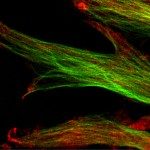Lien vers Pubmed [PMID] – 19632260
Toxicon 2010 Jan;55(1):61-72
Alpha-toxin is the unique lethal virulent factor produced by Clostridium septicum, which causes traumatic or non-traumatic gas gangrene and necrotizing enterocolitis in humans. Here, we analyzed channel formation of the recombinant septicum alpha-toxin and characterized its activity on living cells. Recombinant septicum alpha-toxin induces the formation of ion-permeable channels with a single-channel conductance of about 175pS in 0.1M KCl in lipid bilayer membranes, which is typical for a large diffusion pore. Septicum alpha-toxin channels remained mostly in the open configuration, displayed no lipid specificity, and exhibited slight anion selectivity. Septicum alpha-toxin caused a rapid decrease in the transepithelial electrical resistance of MDCK cell monolayers grown on filters, and induced a rapid cell necrosis in a variety of cell lines, characterized by cell permeabilization to propidium iodide without DNA fragmentation and activation of caspase-3. Septicum alpha-toxin also induced a rapid K(+) efflux and ATP depletion. Incubation of the cells in K(+)-enriched medium delayed cell death caused by septicum alpha-toxin or epsilon-toxin, another potent pore-forming toxin, suggesting that the rapid loss of intracellular K(+) represents an early signal of pore-forming toxins-mediated cell necrosis.
